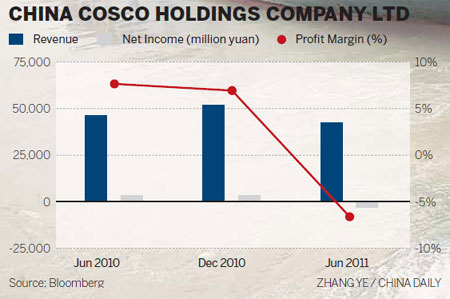COSCO forms strong anchor for Boston port
 0 Comment(s)
0 Comment(s) Print
Print E-mail China Daily, March 6, 2012
E-mail China Daily, March 6, 2012
|
|
|
A fully laden COSCO container ship leaves Qingdao Port, Shandong province. Wei Jiafu, chairman of COSCO, said that Chinese companies need to seize opportunities in the US market. [China Daily] |
China Ocean Shipping (Group) Company, or COSCO, the largest shipping group of China, has been recognized in Massachusetts for its contribution in helping the ailing US economy and job market.
The recognition comes a decade after the State-owned Chinese company opened a direct service between China and Boston, saving about 9,000 jobs in the New England area.
In March 2002, COSCO decided to open a direct vessel service to the Port of Boston after the Danish shipping giant Maersk Line, part of AP Moller-Maersk Group, closed its lines to the port.
Over the past 10 years, COSCO's cooperation with the Massachusetts Port Authority (Massport), known as the "COSCO-Massport model", has preserved more than 34,000 jobs, said David Mackey, the interim CEO of Massport.
On March 2, the 10th anniversary of the start of the service, COSCO's Chairman, Captain Wei Jiafu, received an "International Business Leader" award from the Coalition of New England Companies for Trade in recognition of the Chinese company's continued support.
"In the last 10 years as the global economy rose and fell, through good and bad times, no matter what, COSCO kept its promise and remained at the Port of Boston. It saved jobs and created more (jobs)," said Wei.
Two years after opening the service, Premier Wen Jiabao visited Boston's Conley Terminal, where he praised the COSCO-Massport relationship as a model that other Chinese and US businesses should follow.
To acknowledge China's support, Massport and the International Longshoremen's Association, the largest union of maritime workers in North America, nominated Wen a "Best Friend of the American Worker" at an event to mark the 10th anniversary of the relationship.
Zhang Yesui, the Chinese ambassador to the US, who collected the award on behalf of Wen, said the COSCO-Massport model reflects the win-win economic relationship between the US and China.
Zhang said the relationship shows that the two powers are cooperating in a full range of areas and Chinese business and trade can make a contribution to the US economy and help create jobs.
Zhao Qizheng, spokesman for the ongoing annual session of the National Committee of the Chinese People's Political Consultative Conference, also cited the COSCO-Massport model as a good template for Chinese companies going global.
Recalling how he was approached by Jane Swift, who was the governor of Massachusetts then, Wei said he saw the approach as a long-awaited opportunity for COSCO, a Stated-owned company that was considered by some people in the US as "somewhat different (with a negative connotation)".
"It's time we took opportunities like this in the US market, so we can show people that our State-owned companies come here to bring high-quality services and to offer help in times of need," said Wei.
"Those who don't know China's market well tend to think Chinese State-owned companies are all controlled by the government. 'Owned' doesn't equate with 'controlled', many SOEs enjoy operating in the market economy," he added.
Massport values the friendship with COSCO because it helped expand business opportunities with China in the New England region.
Before COSCO, the Port of Boston only had a direct connection with Europe. However, COSCO's weekly service made it possible to connect the New England region with Asia and China - important emerging markets in the global economy.
"It has been a remarkable turnaround for the Port of Boston. The main reason has been our partnership with COSCO and the vision of Wei," said Mackey, describing Wei as a "loyal friend to the Port of Boston" despite difficult financial times.
When the service first started, fewer than 50 containers per week came into Boston from China and Asia. Now the average weekly number is more than 1,000.
"We never thought of stopping the service, even during the difficult times," said Wei.
Michael Leone, port director at Massport, said COSCO is a primary carrier at the Port of Boston, shipping about 60 percent of the total container numbers (20-foot equivalent units) at the Port.
Leone said the relationship with COSCO will also help businesses in the New England area to navigate opportunities in the Chinese market.
"So many US companies are manufacturing goods overseas and importing them to this area. Certainly, with the growth of the middle class in China, there are a lot more exports returning to China as well," said Leone.
China was the third-largest export market for US goods in 2010, according to the Office of the US Trade Representative. In 2010 US exports of goods to China totaled $91.9 billion, equal to 7 percent of US exports that year and a rise of roughly 32 percent from 2009 and 890 percent from 1994.
Wei said COSCO will continue to focus on the US market in the coming years because he sees a promising future in the shipping industry as China starts to import more from the US.
"Ten years ago, you would see ships carry full containers of goods from China, but only about 30 percent of the containers were full when they returned. Now things are improving because China has started to import more from the US and that is a good thing for our business," said Wei.
"I think it is just starting to pick up and will just get better," he added.



![A fully laden COSCO container ship leaves Qingdao Port, Shandong province. Wei Jiafu, chairman of COSCO, said that Chinese companies need to seize opportunities in the US market. [China Daily] A fully laden COSCO container ship leaves Qingdao Port, Shandong province. Wei Jiafu, chairman of COSCO, said that Chinese companies need to seize opportunities in the US market. [China Daily]](http://images.china.cn/attachement/jpg/site1007/20120306/001aa0ba5c8510bfb2d220.jpg)



